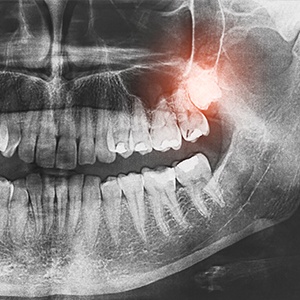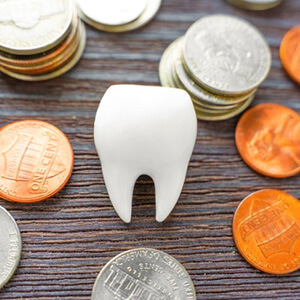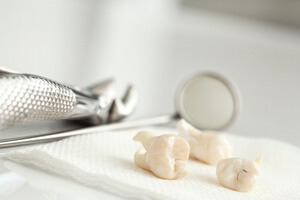Wisdom Tooth Extractions – Jupiter, FL
Pain Relief
From Hurting Teeth
Wisdom teeth tend to cause people more problems than any other teeth, and resolving them can be a hassle for patients who believe they have to get a referral from a general dentist before they can be removed. That’s not the case for people in Jupiter, Palm Beach Gardens, West Palm Beach, and the surrounding cities in Florida! With us, patients can skip the middleman and visit South Florida Oral & Maxillofacial Surgery directly for wisdom tooth extractions in Jupiter, FL. We can perform the extraction procedure as we have countless times before, stopping annoying pain and preventing other issues from developing down the line.
Why Choose South Florida Oral & Maxillofacial Surgery for Wisdom Tooth Extractions?
- Happy to Serve Teens & Adults Alike
- We’re On Call 24/7!
- Dental Insurance Welcome & Maximized
Indications for Wisdom Teeth Removal
Impacted Wisdom Teeth

Wisdom teeth may become impacted when there is not enough room in the mouth for them to erupt normally. This can lead to issues with overcrowding, as well as damage to the surrounding teeth and bone. Impacted wisdom teeth are also more difficult to clean, and may, therefore, lead to an increased risk of tooth decay or gum disease. For some, impacted wisdom teeth cause no problems whatsoever, but more often require removal to prevent or eliminate other dental issues.
Preparing for Wisdom Teeth Removal

The specifics of each individual case will be reviewed at your initial consultation. Your wisdom teeth can be removed if you have an active gum infection. Ideally, you should not smoke for at least two weeks before having your wisdom teeth removed. We understand this isn’t always possible, so a general rule is that smoking tends to slow the healing process down.
Wisdom teeth removal quite often requires general or twilight anesthesia. For this reason, you will need to refrain from eating or drinking for around 6 hours before your appointment as well as ensuring you have someone who knows you driving you home after the procedure is completed.
Wisdom Teeth Removal

You will be provided local anesthesia or IV sedation. Next, incisions will be made in your gums, allowing your doctor to access the bone that lies over the top of your tooth. This bone will then be removed to expose an impacted tooth or one that has not fully erupted. Typically, the tooth is sectioned and removed, making it possible to eliminate as little bone as possible.
If your wisdom tooth has fully erupted, it may sometimes be extracted just like any other tooth, which normally involves using forceps to loosen it from its socket or the tooth may require being sectioned into multiple pieces as well.
After Extraction of Wisdom Teeth

During your recovery period, you should:
- Keep a gauze at the operative site for the first few hours up to 24 hours. Change the pad whenever it becomes fully soaked with blood.
- Use an ice pack on your cheek two or three times each day for 20 minutes at a time.
- Rinse your mouth several times daily with warm saltwater.
- Consume only soft foods, such as gelatin or broth, adding solid foods back in gradually as your mouth begins to heal.
- Brush and floss your teeth as normal but avoid the opening where your wisdom teeth were removed.
Understanding the Cost of Wisdom Tooth Extractions

If you’ve been recommended to undergo wisdom tooth extraction, you’ll likely want to know everything you can about the cost of the treatment. Since every procedure will vary based on every unique patient, we won’t be able to provide you with an exact price estimate until we’ve been able to assess your mouth through an initial consultation. During your visit, we can review the specifics of your procedure as well as your financing options so that you can undergo the necessary treatment while staying within your budget.
Factors That Can Impact the Cost of Wisdom Tooth Extractions

The cost of wisdom tooth extractions will typically depend on various factors that our team will thoroughly discuss during your initial visit. The common ones can include:
- The number of teeth needing extraction: In many cases, our team will recommend removing all four wisdom teeth during a single appointment to avoid the need for multiple visits. However, not everyone has all four. Additionally, some patients might choose to remove one or two at a time, affecting the overall price.
- The level of difficulty for extraction: Some wisdom teeth will be fully erupted and can simply be removed with a simple extraction. Others may be impacted or stuck beneath the gum line, making the procedure more difficult to perform and can raise the cost of treatment.
- The type and amount of sedation: Our practice offers local anesthesia as well as sedation dentistry options to help you remain pain-free and completely relaxed throughout your procedure. The kind and quantity of each solution can influence the overall cost of your treatment.
Does Dental Insurance Cover Wisdom Tooth Extractions?

Not every dental insurance plan will offer coverage for oral surgeries, but the majority of them can provide partial help for wisdom tooth extractions. The amount covered will usually be based on factors like meeting your annual maximum and/or deductible. Of course, every plan will be different for each patient, so it’s best to consult your insurance company for the details of your benefits before moving forward with your treatment. You can even discuss your policy with our team and we’ll be happy to help you get the information you need to take full advantage of your perks.
How to Make Wisdom Tooth Extractions Affordable

Even if dental insurance isn’t in the picture for you, it doesn’t mean you’ll be completely out of options. To help you work within your budget, our team is proud to offer financing plans through third-party financiers like CareCredit and PatientFi. These companies can help split up the total price of your dental care into monthly installments, most of which come with low to no interest!
Wisdom Tooth Extraction FAQs

We want our patients to feel as comfortable as possible going into any procedure, which is why our team is always happy to answer any questions. Below, we’ve gone ahead and addressed some of the most common questions we receive related to wisdom tooth extractions. Hopefully, you’ll find plenty of helpful information, but if there is anything else you’d like to ask, don’t hesitate to give us a call.
Is a wisdom tooth extraction painful?
While any type of oral surgery may sound unpleasant, we take every step necessary to ensure a smooth, uneventful, and pain-free experience for our wisdom teeth patients. Thanks to our use of IV and general sedation, most patients end up sleeping through the entire procedure and waking up with no memory of it afterward. A person may feel a little drowsy, but they certainly won’t have to deal with pain!
How long is the recovery process after a wisdom tooth extraction?
The recovery will vary from patient to patient depending on their situation, but on average, it should take about a week before a patient’s mouth feels completely normal. Typically, a person can resume their normal daily activities after a day or so. Once the initial healing period is over, a patient may just need to stick to soft foods and take medication as needed.
How early can someone get a wisdom tooth extraction?
We can perform a wisdom tooth extraction as soon as they start to cause problems, or we can be even more proactive and remove them if we have good reason to believe they will cause an issue in the near future. So, we often see patients as young as 16 or 17 for wisdom tooth extractions. For parents, it’s important that they take their child to their general dentist for regular checkups so that the wisdom teeth can be monitored, and if needed, removed before they cause serious pain or damage.
Will a wisdom tooth extraction be covered by my insurance?
Most dental insurance plans provide some type of coverage for wisdom tooth extractions. This can range from 50-80% of the cost of the procedure, plus insurance can also be used to cover exams, X-rays, anesthetic, and other factors related to the treatment. If we recommend that you or your child undergo a wisdom tooth extraction, we will also discuss how we can make the treatment affordable, going over your insurance benefits and financing options. Once a payment plan is agreed upon, we can even file your claim for you so that you gain instant access to your benefits and savings.
Why do we have wisdom teeth in the first place?
For our early human ancestors, wisdom teeth were beneficial. In those days, the average person’s diet consisted of many tough-to-chew foods, including raw meat and roots. To handle such meals, they needed broader jaws and stronger molars. Larger jaws meant their mouths had plenty of room for wisdom teeth.
Today, though, most of the foods we eat are softened through cooking or other means of preparation. This means the wisdom teeth are no longer needed. And since the modern person’s jaw usually isn’t large enough to accommodate wisdom teeth, they tend to cause more harm than good when they erupt. This is why extraction is typically needed.
Does everyone have wisdom teeth?
Most people have a full set of four wisdom teeth, but some are missing a few or don’t have any at all. One study found that anywhere between 5% to 37% of people do not have all their wisdom teeth. It seems to be linked to genetics, so if your parents didn’t have all their wisdom teeth, you might be missing a few as well. We can determine exactly how many wisdom teeth you have with the help of a dental X-ray. This lets us plan your treatment appropriately.
How do you make wisdom teeth pain go away?
The only permanent solution for hurting wisdom teeth is to have them extracted. That said, it is possible to manage the pain on your own until it’s time for your appointment.
- Apply an ice pack wrapped in a towel to the outside of your cheek for 20 minutes every few hours.
- Take ibuprofen or another over-the-counter medication. Make sure you follow the instructions on the label.
- Rinse your mouth with salt water several times throughout the day. Always spit; do not swallow. This can help soothe agitated tissues and keep bacterial buildup near the impacted wisdom teeth to a minimum.
What can I eat after wisdom tooth surgery?
While your mouth is still numb after the procedure, you need to be careful of what you eat or drink. Avoid any hot foods that might inadvertently burn your mouth if you’re not careful. You should also stay away from anything chewy or crunchy that might cause you to bite the soft tissues inside your mouth. In general, you should plan on a soft food diet for at least the next three days; you can go back to more solid foods once you feel ready.
How do you sleep after wisdom teeth removal?
We’ll give you guidelines on what medications you can take to stay comfortable at night. Always stick to the recommended dosage. You should keep your head elevated for at least 24 hours after the extraction, so it may be a good idea to sleep on an extra pillow or two. Take whatever steps are necessary to avoid dry socket, which is very painful and can make it especially difficult to get to sleep.
Does everyone have wisdom teeth?
Most people develop four wisdom teeth. However, a 2015 article from the Dental Research Journal estimated that 5-37 percent of people are missing one or more of their wisdom teeth. Keep in mind that even if you cannot see yours, they may be present, but could be hidden beneath the gumline. An X-ray is the best way to tell if you have them. Also, it is worth noting that while most people develop them in their teens or early 20s, some people get them earlier or later in life.
How should I prepare for my wisdom tooth extraction?
One of the most important things you can do to prepare is to talk to the doctor who will perform the extraction. Your oral surgeon in Jupiter will be happy to answer your questions and address any concerns you might have. Our team wants you to be able to commit to the procedure with confidence! Other things you can do include:
- Arrange for someone to drive you to and from our office.
- Do not smoke for at least 12 hours prior to your appointment.
- Wear comfortable clothing. (If you are getting IV sedation, it should be easy to roll up your sleeves.)
- Stock up on soft foods to eat after your procedure. Items like applesauce, ice cream, smoothies, and yogurt are good choices.
What’s the best age to get wisdom teeth removed?
There are no hard-and-fast rules about the appropriate age for wisdom tooth extractions in Jupiter. However, the procedure generally happens in young adulthood because it is easier to extract the teeth before they are completely developed and strongly embedded in the jaw. Younger people also tend to have an easier time recovering from the procedure. If your dentist recommends wisdom tooth removal for you, it is best to get it done sooner rather than later so you can avoid future problems.
Should wisdom teeth be removed if they don’t hurt?
It is true that not everyone needs to have their wisdom teeth removed. However, many people choose to do so as a purely precautionary measure. If you are considering undergoing the procedure, our team can let you know about both the risks and potential benefits of moving forward.
How long does wisdom tooth surgery take?
It depends on how many teeth are being removed. It usually takes 15-20 minutes for a single wisdom tooth to be removed, so if you’re having all four taken out, the estimated timeline is typically around 90 minutes. Of course, this can vary based on the location, position, and condition of each tooth. We’ll make sure that you and the person driving you have a reliable timeline to work with before we begin. If you’re being sedated for the procedure, then it will barely feel like any time has passed at all no matter how long your surgery takes.

